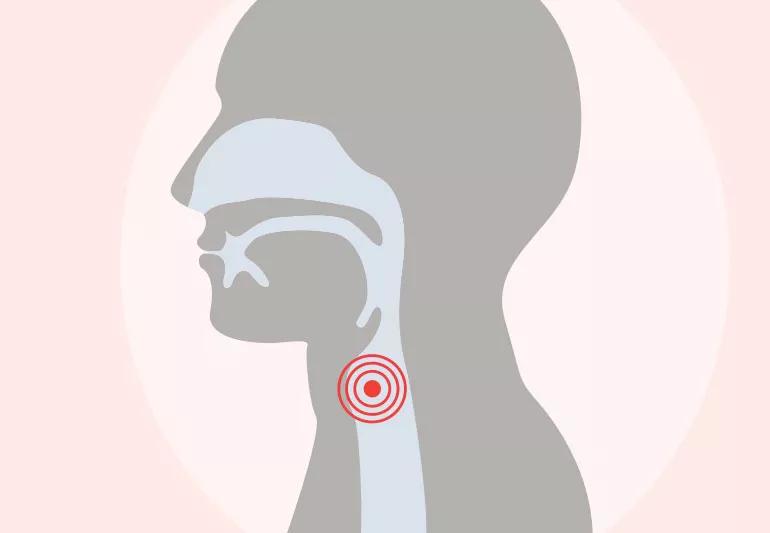Life after laryngectomy includes different ways of communicating

Image content: This image is available to view online.
View image online (https://assets.clevelandclinic.org/transform/a9d46ad9-21a3-4f21-8679-101fd46dd568/throatCancer-856476996-770x553_jpg)
illustration of area where throat cancer appears
Not everyone who goes through treatment for laryngeal cancer will need to have surgery.
Advertisement
Cleveland Clinic is a non-profit academic medical center. Advertising on our site helps support our mission. We do not endorse non-Cleveland Clinic products or services. Policy
Your care team will do everything they can to preserve as much of your voice as possible. But if a partial or total removal of your voice box (larynx) is necessary, the recovery process will include learning to speak without your vocal cords.
Fortunately, there are effective ways to restore speech after a laryngectomy, and a speech-language pathologist will be there to support you along the way.
“With some of the newer speaking prostheses, a lot of people can still communicate with a human-sounding voice – it’s just deeper and a little more guttural sounding,” says otolaryngologist Paul Bryson, MD.
The larynx, or voice box, is an organ in your throat that connects your lungs to your nose and mouth. It plays a function in your speaking, swallowing and breathing.
Cancer can develop in any of the three distinct parts of the larynx:
Prognosis and treatment options depend on where the tumor is located and how big it is.
“There are always two goals with treatment: to eradicate the cancer and preserve as much of the function of the larynx as possible,” Dr. Bryson says.
If you and your care team decide that the best option is to remove all or part of your larynx, there are a few things that will happen during your surgery.
Advertisement
The trachea (windpipe) and the esophagus (food pipe) will be disconnected, and part or all of the larynx removed. If lymph nodes have been affected by the cancer, they may also be removed.
During a total laryngectomy, the surgeon will also create a permanent hole in your neck – a stoma – that will become your new airway.
The surgeon may also perform a primary voice puncture, which sets the stage for regaining your voice after surgery. (This can also be done after your laryngectomy). They create a pathway between your windpipe and esophagus and place a small, one-way valve (voice prosthesis) in it.
As you recover in the hospital and at home, you’ll stay in close contact with your care team. A speech-language pathologist who specializes in post-laryngectomy voice rehabilitation will work with you to adapt or learn one or more of the following ways to communicate:
Voice prosthesis: If you had a voice prosthesis placed during or after surgery, you’ll be able to learn tracheoesophageal speech. When you cover your stoma with your finger as you exhale, air is redirected through the valve and into your esophagus. Muscle vibrations in the esophagus will create sound as the air flows through it, and you can shape that sound with your mouth and tongue. Newer, hands-free prostheses may make it possible for you to not have to cover the stoma while you speak.
Some kinds of prostheses need to be taken out and cleaned regularly. Others are designed to only be removed by medical professionals and need to be changed every couple of months. Your care team will help you decide on the right prosthesis for you before surgery.
Artificial larynx: These battery-operated, handheld devices are easy to use, although the sound produced has a robotic quality. You hold up the device against your neck, and it turns vibrations into sounds. You can use your tongue and mouth to turn the sounds into words.
Esophageal speech: This method of speech is used less often than others. To do it, you learn to move air down into your esophagus and release it in a controlled way to create sound.
Regardless of which method is best for you, it’s critical to be engaged in the education process and lean on your loved ones for support. “I think the patients that do the best are the ones that have supporting family and friend networks that help them make their appointments and help them make the transition,” Dr. Bryson says.
Advertisement

Delivered every Tuesday!
Sign up for our Health Essentials emails for expert guidance on nutrition, fitness, sleep, skin care and more
It's a letter about the news!

Every two weeks once
Sign up for our Health Essentials emails for expert guidance on nutrition, fitness, sleep, skin care and more.
Learn more about our editorial process.
Advertisement
Most recommended precautions center around minimizing bruising or swelling
Even one drink can have an impact on your cognitive function leading to slurred speech, blurred vision and impaired memory
Understand who may (and may not) benefit
Lorem ipsum dolor sit amet. Et odio Quis vel ipsam omnis eum alias deleniti et placeat impedit non voluptas galisum hic autem enim et cupiditate aliquid. Est beatae quidem non facilis autem ut commodi nisi aut tempore rerum et dolores voluptatem cum enim optio id sapiente quasi. Ad laboriosam officiis 33 cupiditate sequi ea voluptatum consectetur qui necessitatibus voluptate et quasi doloremque et facere explicabo quo explicabo officia
Seeking help through therapy can be an important step in improving your quality of life when you have UC
Type 2 diabetes isn’t inevitable with these dietary changes
Applying a hot or cold compress can help with pain
Pump up your iron intake with foods like tuna, tofu and turkey